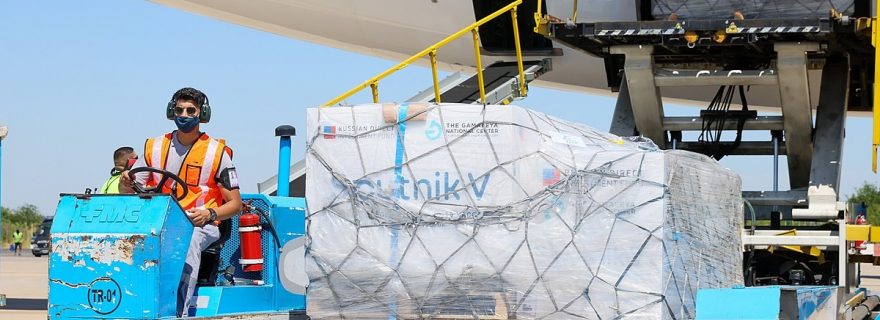Covid-19 Vaccine Diplomacy – the Exclusive Game and its Powerful Players
With access to Covid-19 vaccines being regarded a soft power asset, a few powerful countries use vaccine shots to further their own diplomatic objectives, in a move that is symbolically potent but without clear pragmatic benefits so far.
At the beginning of 2021, the second year of the devastating Covid-19 pandemic, the successful global drive for vaccine development offered hope for a gradual recovery. Amidst the international race to roll out vaccines, great power competition and rivalry also found a new stage – that of vaccine diplomacy. The term itself refers to countries relying on “the use or delivery of vaccines” as part of “international efforts to ensure universal or equitable access for low- and middle-income countries to urgently needed vaccines for diseases of pandemic potential”. In the context of the Covid-19 pandemic, a handful of powerful nations have used their access to vaccines as a soft power asset to achieve foreign policy goals, by exporting (either free or for a price) vaccine shots to foster stronger ties with nations and regions where they seek greater goodwill and influence, and to enhance their global reputations. This piece provides a brief overview of vaccine diplomacy as it is occurring at present and the key countries engaged in its exercise.
As the battle over vaccine diplomacy first erupted in late 2020, China and Russia stole the march on the West, which seemed to be practising a policy of focussing on domestic populations, or vaccine nationalism. Wealthy Western countries like the UK, US, Canada, and the EU bloc procured several million shots from Western companies for their citizens, even amidst growing concerns over vaccine inaccessibility for the poorer countries of the world. On the other hand, by mid-February, China had sent shots of its Sinovac vaccine to more than a dozen countries across South-East Asia, Africa, South America and the Middle East, where it hopes to advance its trade interests. Similarly, Russia sent supplies of its Sputnik V vaccine to countries in Eastern Europe, Central Asia, the Middle East as well as South America. An early and interesting case of Covid-19 vaccine diplomacy in practice that of Serbia where the EU has often vied with Russia, and increasingly China, for influence. As a beneficiary of vaccine diplomacy from China and Russia, and having purchased Western-made vaccines, Serbia provides its citizens with the choice of multiple vaccines, and now practices its own vaccine diplomacy in the Balkans region.
A slightly late entrant to the game, India quickly made up for lost ground, with millions of shots of the domestically-manufactured AstraZeneca vaccine being sent to its South Asian neighbours as well as several countries in Africa, the Middle East and South and Central America. Here, India also attempts to counter rising Chinese influence in its immediate neighbourhood and beyond. Low domestic infection rates in the beginning of 2021 and its status as the world’s largest manufacturer of pharmaceuticals and vaccines also enabled the nation to fulfil its commitments under the Covax initiative of the Global Alliance for Vaccines and Immunisation (GAVI). However, Indian vaccine diplomacy has hit major roadblocks of late – first with the safety-related restrictions on the AstraZeneca vaccine by a few countries, and more recently with the catastrophic resurgence of domestic Covid-19 infections which has prompted the country to temporarily ban all vaccine exports. China is now aiming to plug this gap in the global vaccine supply, and also utilising this opportunity to make further inroads into South Asia, a region traditionally under Indian influence.
In the case of the US, with vaccine supply slowly starting to surpass demand, the country is now foraying into vaccine diplomacy. With the goal of strengthening regional partnerships and a North American economic recovery, the focus seems to be on its immediate neighbourhood, as evidenced by the US sending its unused shots to Canada and Mexico. Overall, however, with the US, UK, EU and Canada still preoccupied with domestic vaccination drives, these nations are argued to be “slow to fully exploit the geopolitical opportunities of vaccine diplomacy”. At the same time, Russia and China have persevered in their efforts, indicating their eagerness to take on a global leadership role in times of crisis.
With the pandemic and vaccination drives still ongoing, it is too soon to tell whether their endeavours will lead to concrete diplomatic gains for the concerned great powers. Many questions still remain – Will more Western nations begin large-scale exports upon achieving domestic inoculation? Will India restart its exports once its domestic crisis is under control? Will the (re)entry of other players impact the diplomatic fortunes of Russia and China? An aspect that has not gone unnoticed, however, is the narrative – in the thick of a global crisis where the poor suffer the most and the dangers of global vaccine inequality are rampant, a few countries have offered assistance while others look inwards. Thus, the powerful symbolic value of vaccine diplomacy seems clear, even though the long-term foreign policy benefits may not yet be.


